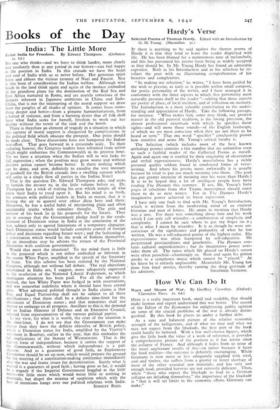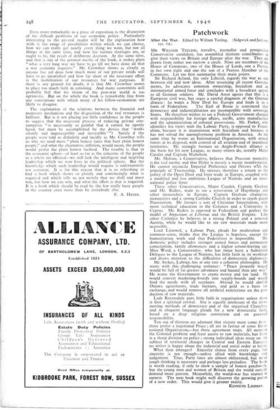How We Can Do It
HERE is a really important book, small and readable, that should make layman and expert understand this war better. The record of the Editor of the Economist for enlightening public opinion on some of the crucial problems of the war is already distin- guished. By this book he places us under a further debt.
As a sane and balanced picture of the relative economic strength of the belligerents, and of what we may and what we may not expect from the blockade, the first part of the book could hardly be bettered. With a few well-chosen figures, which give the little book the value of a work of reference, it provides a comprehensive picture of the position as it has arisen since the collapse of France. And although it hides from us none of the more unpleasant results of this—or rather because it faces the hard realities—the outcome is definitely encouraging. While Germany is now more or less adequately supplied with steel, coal and timber, she suffers from a greater or lesser shortage of most of the other essential raw materials, and has only just enough food, provided harvests are not seriously deficient. Thus, while " those who expect the blockade to lead to a German collapse are deluding themselves," the importance of the blockade is " that it will set limits to the economic efforts Germany can make." Even more remarkable as a piece of exposition is the discussion of the difficult problems of our economic policy. Particularly interesting to the ger. eral reader will be the explanation how wide is the range of possibilities within which we can choose, how we can really get nearly every thing we want, but not all things at the same time, and how the various shortages are, or ought to be, the result of deliberate decision. At the same time, and that is one of the greatest merits of the book, it makes plain " what a very long way we have to go till we have done all that a war economy requires." Mr. Crowther shows as clearly as anyone has yet done how much more of our private needs will have to go unsatisfied and how far short of the necessary effort is the mobilisation of our resources for war purposes. If there is any ground for doubt, it is that Mr. Crowther seems to place too much faith in rationing. And many economists will probably feel that his vision of the post-war world is too optimistic. But on the whole the book is remarkably free from any contentions with which many of his fellow-economists are likely to disagree.
The explanation of the relations between the financial and monetary mechanism and the disposition of the real resources is brilliant. But is it not placing too little confidence in the people to suggest that the necessary process of reducing private con- sumption "is necessarily so painful that it cannot be openly faced, but must be accomplished by the device that ' works silently and imperceptibly and irresistibly ' "? Surely if the people were told as definitely and lucidly as Mr. Crowther tells us why we need more " plain honest taxes that hurt plain honest people," and what the alternative, inflation, would mean, the people would prefer the plain honest method. The trouble is that in the economic sphere—at least so far as the concerns of the people as a whole are affected—we still lack the intelligent and inspiring leadership which we now have in the political sphere. But the knowledge which such leadership would require is unfortunately not common. It is for this reason that it is so refreshing to find a book which shows so plainly and convincingly what is required and which tells us not merely that we shall and must win, but how we can win, and what the effort is that is required. It is a book which should be read by the few really busy people in the country even more than by everybody else.
F. A. HAYEK.



























 Previous page
Previous page